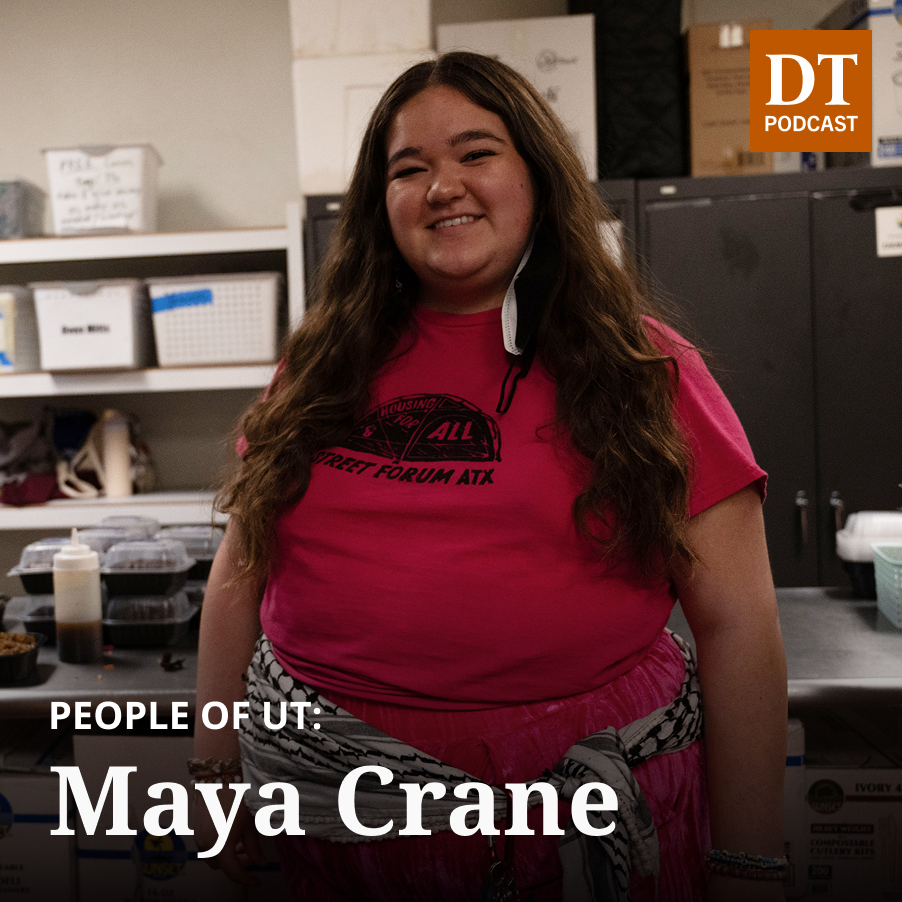Hannah Berns: Welcome to Longhorn Essentials: your guide to all things adulthood and
UT. I’m Hannah Berns and today’s episode we discuss prescriptions.
*Music*
Whether you are a first-time student or about to graduate, college comes with changes that can be difficult to cope with. UT Austin’s Counseling and Mental Health Center is here to provide students with the tools to help them take care of their mental health and thrive during their college careers. One of these tools is psychiatric care and medications. Dr. Melissa Eshelman, Senior Director and Chief of Psychiatry at the Counseling and Mental Health Center, known as the CMHC, tells students seeking this care where to start.
Dr. Melissa Eshelman: The student only has to make one call. That would be directly to our BART, or our triage counselors.
Hannah Berns: “BART” stands for Brief Assessment and Referral Team. They are a team of triage counselors who provide initial patient assessments. When seeking psychiatric care at UT Austin, whether students are taking medications prescribed by another medical provider and wish to transfer their care to UT, are seeking a therapist and have decided on medication as a next step, or don’t have a referral and are just curious about the process of going on medications, they should first call BART at 512-471-3515 at option #3. During this 15-minute call, a BART team member will collect information about the caller and their care goals and will decide on
next steps.
Dr. Melissa Eshelman: We do have psychiatrists available here at CMHC right now. That’s a total of three, two other psychiatrists and myself. So, given how large our University is, not many, but we are available to provide in person services. So, especially for students who want to be seen in person, because it’s a small crew, our services are time limited.
Hannah Berns: Given this, CMHC usually offers students four to six psychiatry sessions per semester–although this is not a rigid number for those who need the extra guidance, particularly with medications–and then assists them with finding care beyond that. Some students feel comfortable being seen by the UT primary care staff. If students have psychiatric care needs and preferences outside of what UHS or CMHC psychiatrists can provide, they may refer them to off-campus psychiatrists or third-party psychiatry services. This can often be decided during the BART assessment.
Dr. Melissa Eshelman: There are community psychiatrists, and then we also have TimelyCare. TimelyCare, it can also be offered to a student who very much wants virtual care…TimelyCare can be an excellent option of being able to meet with a psychiatrist virtually. And they do have evening and weekend hours.
Hannah Berns: TimelyCare is a virtual platform partnered with UT Austin that provides free mental health services, including psychiatry services. With the transition to this platform or alternate care providers, UT psychiatrists accommodate students’ preferences in terms of medical title/role, experience, gender, culture, language, and any other factors. UT psychiatrists can also speak with students’ new providers if they wish or help students send their new provider any part of their record that they feel is necessary to send.
*Music*
CMHC services are not covered by insurance, and the psychiatry services at CMHC are $10 a visit. However, there are options for students who cannot pay this fee. Psychiatrists at UT can do free phone check-ins with student patients in-between visits. The front desk can temporarily lift the fee so students can register, giving them more time to pay. Students can also work with the front desk to set up a payment plan that works for them.
Dr. Melissa Eshelman: We want to continue to work with students, and so we’re very respectful of the fact that finances can be very tight. So I think I’m especially attuned to that and want to make sure the other psychiatrists are as well.
*Music*
Hannah Berns: CHMC psychiatrists are aware of the stigma surrounding mental health and tailor their care to make students feel safe and comfortable.
Dr. Melissa Eshelman: I think many students are fearful, they’re worried about medication treatment, and I emphasize to our psychiatrists to please meet where students are at.
Hannah Berns: Melissa wants students to know they do not have to feel rushed to act on BART’s recommendations, that they should not feel ashamed to contact CMHC back if they have stopped taking their medication, and that, if this is the case, CMHC will give students what they need to get back on track.
Dr. Melissa Eshelman: Although scary, medication treatment can be so beneficial to assisting with different types of symptoms, especially depression and anxiety, which make it so hard for students to perform academically.
*Music*
Grace Garcia: I just kind of wanted to like talk to someone, because I mean like freshman year is a pretty hard year.
Hannah Berns: Here’s Grace Garcia, a UT freshman studying RTF and Plan II, talking about her experience with CMHC services. Grace has been going to therapy for most of her life and is currently taking Lexapro for her anxiety.
Grace Garcia: I wanted to just talk about my brain fog and maybe how to prevent that, or not necessarily prevent, but like get through that. And we did talk about it, just like the different methods, like, you know, five things you can see, five things you can touch, stuff like that. And it was like helpful.
Hannah Berns: While not seeking explicit help with her prescription, Grace was able to easily access and use CMHC counseling services as a supplementary tool. She sees mental health as something to address in order to be the best version of yourself possible.
Grace Garcia: I think you won’t be able to do good if you’re not in a good place mentally, like mental health is a big part of doing well in academics.
*Music*
Hannah Berns: Beyond the health care CMHC offers, UT students can find mental health support among their peers. Soha Jashwant, second-year Health and Society major, serves as President of Swear2Care at UT, a student-led chapter she started to raise awareness for youth mental health and provide a supportive space for those seeking support and connection. Jashwant believes it is very important for UT students to prioritize their mental health.
Soha Jashwant: So I think at its core, caring about your mental health, or just mental health in general, boils down to understanding and acknowledging that your heart and your mind deserves as much care as your academic achievements, as well as your physical well being.
Hannah Berns: It is often hard to view your mental health as a priority in environments where success and productivity are highly valued. However, these are often the spaces where it is most important to take care of yourself. Soha expands on this.
Soha Jashwant: Not only is it super crucial to your functional well being, like you won’t be able to function to the maximum potential that you can of course, if your mental health isn’t, isn’t where it should be. But it’s also going to contribute to bringing more meaning to your life and to your purpose. And it really just brings more color to whatever you’re doing in general.
Hannah Berns: While fighting the stigma that surrounds mental health often feels like an uphill battle, it is still important for people to seek help when they recognize they need it.
Soha Jashwant: I think the first thing for all young people to do is to acknowledge that mental health is, like, it’s part of your overall well being, and it’s not something that’s, like, you’re not going to be perceived as weak or lacking in stability if you acknowledge your mental health needs.
Hannah Berns: As a general rule of thumb, UT students should focus on being kind to themselves and others and feel confident that doing so is a sign of strength.
Soha Jashwant: Since we live in such tumultuous times right now, I think it’s beneficial that now more than ever we show each other love and respect and compassion and support one another as best we can.
Hannah Berns: Soha believes in the ability of UT’s mental health resources to help students do this.
Soha Jashwant: I think on a larger scale though, there are incredible resources at UT that students should definitely seek out.
Hannah Berns: Grace agrees, and encourages others to take the same steps that she did, so that they can thrive as students and people at UT.
Grace Garcia: And so if you feel like you’re struggling or that’s there’s something like weighing you down that you want to talk about, you should talk to someone, and the college does have resources.
Dr. Melissa Eshelman: I just love wrapping up with a student who’s had a very successful response to medication treatment and wishing them well, you know, as we figure out their next steps.
*Music*
Mercy Solis: More information about the topics discussed in this episode can be found at healthyhorns.utexas.edu. The Counseling and Mental Health Center is located in the fifth floor of the Student Services Building at 100 West Dean Keeton Street and is open Monday through Friday from 8am to 5pm. You can also contact CMHC by calling their main line at 512-471-3515.
*Music*
Hannah Berns: This was audio reporter Hannah Berns. Longhorn Essentials is a production of the Daily Texan’s Audio Department. More episodes can be found on your streaming platform of choice. Follow us on Twitter at texan audio (@texanaudio) and check us out at the daily texan dot com (dailytexan.com). Thank you for listening.
*Music*












